#tales of the empire critical
Text
ngl I always find it wild to see Star Wars stuff that's like "if you think about it in terms of realistic statistics/science then..." about almost any aspect of it.
I mean, what about the Star Wars films gives the impression that this universe abides by realistic statistics, or realistic anything else? SW is broadly a fantasy epic projected onto an IMAX screen with a space background painted on it. Yeah, the planets and moons in the films almost always have improbably limited biomes and two major locations max, because narratively these locations are usually just fantasy city-states with space aesthetics.
Starships travel at the speed of plot and we simply jump past the amount of time that presumably is passing, and sort of imply the passage of that time through shifts in the character dynamics. But this passage of time cannot be analyzed with any kind of consistency because the only logic governing it is the pace of the story.
Just how long did it take the Empire to send a full contingent of forces to Dantooine, search the entire planet, find the Rebel base, and then report back to Tarkin between one scene and another? No one says and no one appears to care. How long did it take Han and Leia to reach Bespin and what exactly went on between them while Luke was, in the same time frame, going through a protracted training over multiple days at an absolute minimum? ¯\_(ツ)_/¯
How do giant space worms survive inside asteroids that somehow have an Earth-approximate gravitational field and I guess an atmosphere? Shhhh don't think about it. The point of the sequence is not "how does the giant space worm subsist off this random asteroid and how does it breathe and how does gravity work in this context, seriously" but that the giant worm sequence is fucking sick.
There's probably some after the fact EU justification invented by people who had nothing to do with the original writing of the space worm (or perhaps there are several mutually incompatible explanations) and I am profoundly disinterested in them. Nothing could make this even slightly realistic and it was never intended to be. Star Wars sings space shanties at scientific/mathematical realism as it sails past on a completely different ship going in the exact opposite direction.
And I do mean "sails" because while astronomy might tell us that space is unfamiliar and wild on a level we as Earthbound lifeforms can barely comprehend, Star Wars understands that space is basically an ocean, yet with stars and cool but survivable planets in it, or sometimes it's air but combined with a super cool space background so you can have early 20th century aerial combat that would make no sense in actual space conditions and doesn't need to.
"If you consider relativity, then just running the Empire would be..." General relativity does not govern the galaxy far, far away. Space magic does. I'm not sure there are even time zones.
#hard to overstate the degree to which every attempt to explain#the empire keeping a tentacle monster in a trash compactor for their moon-sized roving death ray murder fortress#just seems incredibly ill-considered. drawing our attention to how weird and improbable all this stuff is does not help#and most people have no trouble accepting bizarre star wars stuff as just part of the 'wacky space fairy tale' logic#there's this really bizarre viral post about how the sw universe actually isn't a fantastic universe bc most inhabitants#would probably never possess or interact with the literal magic imbuing it—but that's missing the basic structural underpinnings#of the story#it doesn't matter how many people can use the force (in the original trilogy very few!) or believe in it or ever see it or anything#the fabric of the story and its setting are governed by fantastic rationales and elements that don't work in rationalistic terms#anghraine babbles#long post#sw fanwank#star wars#sweu critical
109 notes
·
View notes
Text
Tales of Squandered Potential
Oh hello again everyone who follows me for my Star Wars ranting!
So! Tales of the Empire. The Hat Man is at it again.
Episodes 1-3 : The Path of Boredom
As expected, all of the Morgan stuff was not my thing. She was boring in Ahsoka, she was boring here. The entirety of the three episodes just hammered home "this lady is angry" in a way that felt overdone because there is no arc. There's no growth, no interest, no nothing. It all just feels like Filoni trying to retroactively make his one dimensional character that gets killed off in the stupidest way possible feel super badass. However because we know that she gets killed in the stupidest way possible, everything falls flat and none of it feels earned. It also doesn't actually answer any of the many many questions that Ahsoka raised about her. She's just there, standing in front of a fire. That's all she does.
Thrawn is there for all of about two seconds, and every moment of it is painful, because here's the thing. WE KNOW WHAT THRAWN WAS UP TO AT THIS TIME!!! We have the book that explains all of Thrawn's many exploits as an admiral. This is only more evidence for the idea that Filoni has never actually picked up any of the canon Thrawn books. Which we kinda already knew, but this is all but confirmation. As I've previously said, and will continue saying, Filoni needs to contextualize Thrawn as a 100% big bad otherwise his Heir to the Empire fanfilm won't actually feel earned, so he is systematically destroying any and all nuance that Thrawn has had to make sure that new viewers only ever see him as an unredeemable evil.
And I know that there are a lot of you out there who are holding out for the possibility that this is all a misdirect by Thrawn! That this is all part of his grand plan to go back and help the Ascendency, and that he's lying to everyone about his intentions. But the sad truth is that Filoni doesn't give a rats ass about anything other than cartoonishly evil Thrawn which means we're never getting Eli, or Karyn, or Hammerly or any of the characters from the six fantastic canon books that Timothy Zahn so lovingly created. That was made very clear with Filoni's prioritization of Admiral Pellaeon, who for those who don't know is actually in the new canon Thrawn books too! He wasn't just left behind in Legends, Zahn brought him back into canon too! But again, being the Legends fanboy that he is, Filoni doesn't care about where Pellaeon should be canonically, so instead he's just shoehorned into the episode for no other reason then Filoni likes him.
Episodes 4-6 : The Barriss Content
Soooooo, why didn't Barriss get a full fucking season to herself??? I get the idea behind the 15 minute episodes, but it really makes it hard to tell any sort of cohesive story. It works far better as a snapshot of a couple of days in someone's life. So unfortunately, while I did enjoy them, Barriss's episodes felt really rushed and I found it really hard to tell when things took place. How long was she at the Inquisitor training center? Was it a day? Was it a month? Really would have been interested in actually seeing the inner workings but it all has to get brushed over in favor of her becoming an Inquisitor. A seemingly intentionally not named Inquisitor which makes me feel like they've run out of early Inquisitor names. Unless there's a trial period before you get a proper number? I don't know it was just one of those things that niggled at me. Another thing that niggled at me (which was also mentioned by the wonderful artist @stealingpotatoes, go give her art some love) is that her design is kinda boring as fuck? Like, you have Birdy-Mc-Skullface right there with such a neat design and yet all Barriss gets is a motorcycle helmet with very slight voice modulation.
But I digress. The fact that Barriss commits herself to the Inquisitorium via a ritualized fight to the death, and then goes "wait, the red light saber wielding, all black wearing, Darth Vader serving inquisitors aren't here to help people?" before immediately bailing is so funny to me. This girl cannot for the life of her commit herself to an organization without becoming disillusioned within 1-3 business days.
I'm not sure how I feel about it all being about Lyn? I was very much rooting for her to totally die in the ice shafts instead of what felt like a very last minute redemption arc?
Though speaking of the last episode...HOLY SHIT OLD BARRISS IS FUCKING HOT. *coughs* Excuse me. Anyway. I would have loved to see more of what happened in between eps 5 and 6. Seeing how she and the jedi kid escaped the planet, and where the two of them did after than in the very hostile Empire would have been a facinating story watch play out. Also, who is this female friend that Barriss is referring to when she sends the child away? Is it Ahsoka??? If it is...WHY WOULD YOU NOT SHOW US THAT REUNION??? Like I get the whole point of this is to set up Barriss to make the jump to live action like every single other Filoni character is curseddestined to do, but also you've had people waiting years to find out what happened to Barriss and it feels like they burned their biggest story possibility on a throwaway reference. Did she find Ahsoka? Did Ahsoka find her? When did they find each other? Was it pre-Rebellion? Was it after Ahsoka was already functioning as Fulcrum? Given that we now know the Fulcrum name originated from Anakin, did Barriss recognize the name and seek this mystery person out? I don't know it just feels again like more wasted potential.
Final Thoughts
Fuck this animation is good now! Can we get a new writer?
Like, even for the shit I was annoyed by, the entire show just looks fabulous. It makes me really really wish that ANYONE other than Filoni could make content in this style. Let the writers of Jedi: Fallen Order and Survivor do a Merrin episode or a baby Cal episode. Or the people doing The Acolyte, let them do Tales of the High Republic! Let anyone other than Filoni have a chance to create within the world of Star Wars animated content.
#tv rant#as always my ask box is open#i really do love talking about this#so if you've got thoughts you want to share or questions for me#i am always more than happy to respond#dave filoni critical#tales of the empire#rambles#morgan elsbeth#thrawn#barriss offee#star wars
66 notes
·
View notes
Text

Ruby's mum's cloak via Susan: After Sutekh's defeat, what happened to the Memory TARDIS and the evil Susan Triad variant? No idea, but let's headcanon that Ruby Sunday's mama, Louise Miller, found Triad's cloak after old Susan "vanished" along with the Memory TARDIS through the Vortex as time was rewound. Why else would a 15 year old in 2004 be wearing a conspicuous robe like that? Geez Doctor Who, you're always driving me to AI twists to fix your stoopid bits...
#wibbly wobbly timey wimey#empire of death#the legend of ruby sunday#ruby sunday#susan twist#susan triad#doctor who headcanon#doctor who#rtd2 era#rtd2#rtd#anti rtd#rtd critical#nu who#new who#dw art#dw#dw fanart#15th doctor#the 15th doctor#fifteenth doctor#the fifteenth doctor#dw fanfic#ai is a memory of humanity#timey wimey#tales of the tardis#tardis#the tardis#ncuti gatwa#memory tardis
19 notes
·
View notes
Text
Honestly pretty disappointed in Tales of the Empire. The Morgan stuff is alright, doesn't really tell us anything new (except that Thrawn apparently poached the Defender from her. Sure, why not) but it's a fun series of action setpieces showing how she ends up where we see her in the live action stuff. It works.
But Barriss... girl what did they do to you.
I understand wanting to give her a redemption arc (even though she was canonically 100% correct) but the way they do it here...
She already thought the republic was evil. Why does she spend all of episode 2 acting like a generic naive padawan who doesn't understand she's in Evil Club? Why does she become a total pacifist who can't even bring herself to fight someone trying to murder a baby? Who the fuck is Fourth Sister and why is this entire set of episodes seemingly more focused on redeeming her than exploring Barriss?
I wouldn't even mind the Wise Woman healer stuff if it felt earned and not like an attempt to just completely and totally defang one of the most interesting characters in Star Wars. Like... let Barriss be cynical, let her be selfish at first and join the inquisitors just to survive while recognizing the Republic has fully comitted to being the thing she accused it of being. Have her catalyst for leaving the Inquisitors be anything more interesting than "Whaaat??? The Empire is Evil???"
Like when they started episode 2 with hunting a Jedi I expected we were going for the most obvious thing... Luminara. And that would have worked?? Having Barriss killing Luminara, or Fourth Sister doing it in front of her, be the moment she says "fuck this actually" would have been good! Her final straw not being a realization of the Empire's evil, which is already known, but an attack against something she's personally invested in and can no longer be selfish about seems like the most sensical story to tell. But it didn't even *need* to be that, it just needed to recognize Barriss as a person with agency who actually knows what the fuck is going on around her and her own place in it.
Instead she becomes a generic monk character who thinks of the Jedi fondly and has no trace left of radical ideaology besides "maybe killing... is bad" Really disappointing.
19 notes
·
View notes
Text
shaking dave filoni by the shoulders screaming about style vs substance
#there were good moments but overall the writing was so lackluster and the concepts unimaginative :(#not biased or anything but the barriss arc was the better one by far. like morgan elsbeth is so boring i'm so sorry#there are just too many ideas floating around her character and none of them seem to stick! pick one and go for it. not this kind of mess.#taken altogether the show gives off the very strange vibe that they don't really know *what* the empire is?#what it's like to live under a fascist state? what it means to perpetuate it? what it means to be complicit??#not like *****. ***** my beloved forever. ***** and ***** *** u will always be famous#(censored forsafety reasons)#dave filoni#tales of the empire#sw critical
14 notes
·
View notes
Text
Okay, so I have seen Tales of the Empire. Here are my thoughts.
Warning: Spoilers, please proceed as caution.
I'm glad to see the origin story of Morgan Elsbeth. I'm glad to see Grievous back in action. I'm so glad that they didn't kill off Fourth Sister. And I am really glad Barriss Offee is dead bc screw that monster.
But I really wasn't happy with how they ended it. They way Barriss died, I could tell the writers wanted the audience to feel bad about Barriss dying. I don’t feel bad, not at all. Barriss doesn't deserve a Redemption Arc. I loved her as an Inquisitor. I think she was a great villain with somewhat complicated morales. I think the Grand Inquisitor did a wonderful job training her and her "friends". But I wasn't happy with Barriss turning back to the Light side to help others. Barriss should have stayed evil. And before some of you get any ideas or make any assumptions, let me be clear of this disclaimer I have. No, I don't have anything against women. No I don't have anything against Mirialans. No, I don't have anything against people who go through redemption arcs. I really dislike Barriss Offee for the things she has done.
She bombed the Jedi Temple, framed Ahsoka for her crimes, tried to pretend to be Ventress to kill Ahsoka, and worst of all, she killed someone's husband.
She betrayed Ahsoka, one of the greatest warriors in the Galaxy. That, to me, is a sin that cannot be forgiven. Some people go through redemption arcs and deserve it. Barriss isn't one of them. And the fact that she forgave Fourth Sister for killing her was out of her character. She deserves none of the love she gets. She is a traitor, a murderer, and a liar and I am glad she is dead.
I take back everything I said about the Bad Batch Final Episode, this is worse. I'm sorry if this came out as mean or "toxic Star Wars fanboy" vibes, but that is truly how I feel. Again, I have nothing against Mirialans, women, or people trying to redeem themselves, I just have a thing against Barriss Offee.
And don't even say "Oh, but Anakin Skywalker made war crimes during the Clone Wars. He joined the dark side like Barriss, why do you like him and not her-"
That is different. Barriss joined the dark side willingly, Anakin didn't. End of discussion.
I welcome criticism, but don't compare Barriss to Anakin.
This is Purge Trooper, signing out.
3 notes
·
View notes
Text

IT’S MONSTER CLIQUE FOR LIFE !!!!
#mnstrclique#youtube#soulja boy#hip hop#hip hop music#rapper#turbomnstr#underground hip hop#soundcloud#oliver stark#fantasy high#critical role#star wars#ninjago#captain america#tales of the empire#the bad batch#sebastian stan#meme#movie#anime#fashion#new music#vaporwave#art#travis scott#drake#kanye west#nba youngboy#future
5 notes
·
View notes
Text
Some people just cannot think outside of the oppressed-oppressor binary: you’re either “the Man” the obvious villain or you’re “kept down by the Man” who is “sticking it to the Man,” the obvious hero. As a writer/illustrator put it, criticizing George Lucas’ work: “the OT films were the little guys fighting an oppressor… but in the PT, the Jedi had all the power. They were the oppressors. That “fight the power” spirit was gone.” The Jedi Knights are cool as long as they’re hunted by the Empire of the Sith, because they’re “sticking it to the Man.” But if they’re respected by people, if they’re working with the Senate of the Galactic Republic, they’re “the Man” and the Sith and Anakin Skywalker (or somebody else, this Underdog or Little Guy who is supposedly oppressed by guardians of peace and justice is never properly identified, in order to avoid the easily disprovable specifics) are the one who’re “kept down by the Man,” and by default, they’re the ones who’re “sticking it to the Man,” because in their heads, empowered and respected are the characteristics of Evil. And this reveals a deeply troubling mindset: “fight the power” and being victimized by “the power” is what makes you a moral, ethical, good person, even if that power is held by democratically elected officials with checks and balances or fairy tale monks who dedicate their lives to psychological and spiritual progress and to make sure that everyone is protected and there’s peace and justice in the world.
And herein lies the problem: people who only feel secure in their identity as "Good People" if they're fighting against an oppressive power cannot function without it and sooner or later, their desperate yearning for it will create it - and then, they will never be motivated enough to demolish it.
#george lucas#star wars#jedi order#fandom problems#Democracy#social problems#cultural problems#anakin skywalker
966 notes
·
View notes
Text
The Hobbit by J. R. R. Tolkien (1937)
In a hole in the ground there lived a hobbit. Not a nasty, dirty, wet hole, filled with the ends of worms and an oozy smell, nor yet a dry, bare, sandy hole with nothing in it to sit down on or to eat: it was a hobbit-hole, and that means comfort.
Written for J.R.R. Tolkien’s own children, The Hobbit met with instant critical acclaim when it was first published in 1937. Now recognized as a timeless classic, this introduction to the hobbit Bilbo Baggins, the wizard Gandalf, Gollum, and the spectacular world of Middle-earth recounts of the adventures of a reluctant hero, a powerful and dangerous ring, and the cruel dragon Smaug the Magnificent.
Percy Jackson and the Olympians by Rick Riordan (2005-2009)
Percy Jackson is a good kid, but he can't seem to focus on his schoolwork or control his temper. And lately, being away at boarding school is only getting worse - Percy could have sworn his pre-algebra teacher turned into a monster and tried to kill him. When Percy's mom finds out, she knows it's time that he knew the truth about where he came from, and that he go to the one place he'll be safe.
She sends Percy to Camp Half Blood, a summer camp for demigods (on Long Island), where he learns that the father he never knew is Poseidon, God of the Sea. Soon a mystery unfolds and together with his friends—one a satyr and the other the demigod daughter of Athena - Percy sets out on a quest across the United States to reach the gates of the Underworld (located in a recording studio in Hollywood) and prevent a catastrophic war between the gods.
The Lord of the Rings by J. R. R. Tolkien (1954-1955)
In a sleepy village in the Shire, a young hobbit is entrusted with an immense task. He must make a perilous journey across Middle-earth to the Cracks of Doom, there to destroy the Ruling Ring of Power - the only thing that prevents the Dark Lord's evil dominion.
The Chronicles of Narnia by C. S. Lewis (1950-1956)
Four adventurous siblings—Peter, Susan, Edmund, and Lucy Pevensie— step through a wardrobe door and into the land of Narnia, a land frozen in eternal winter and enslaved by the power of the White Witch. But when almost all hope is lost, the return of the Great Lion, Aslan, signals a great change . . . and a great sacrifice.
The Little Prince by Antoine de Saint-Exupery (1943)
The Little Prince is a classic tale of equal appeal to children and adults. On one level it is the story of an airman's discovery, in the desert, of a small boy from another planet - the Little Prince of the title - and his stories of intergalactic travel, while on the other hand it is a thought-provoking allegory of the human condition.
The Inheritance Cycle by Christopher Paolini (2002-2011, 2023)
When fifteen-year-old Eragon finds a polished blue stone in the forest, he thinks it is the lucky discovery of a poor farm boy. But when the stone brings a dragon hatchling, Eragon soon realizes he has stumbled upon a legacy nearly as old as the Empire itself.
Overnight his simple life is shattered, and, gifted with only an ancient sword, a loyal dragon, and sage advice from an old storyteller, Eragon is soon swept into a dangerous tapestry of magic, glory, and power. Now his choices could save--or destroy--the Empire.
Time Quintet by Madeleine L'Engle (1962-1989)
It was a dark and stormy night; Meg Murry, her small brother Charles Wallace, and her mother had come down to the kitchen for a midnight snack when they were upset by the arrival of a most disturbing stranger.
Wild nights are my glory, the unearthly stranger told them. I just got caught in a downdraft and blown off course. Let me sit down for a moment, and then I'll be on my way. Speaking of ways, by the way, there is such a thing as a tesseract.
Folk of the Air by Holly Black (2018-2020)
Of course I want to be like them. They're beautiful as blades forged in some divine fire. They will live forever.
And Cardan is even more beautiful than the rest. I hate him more than all the others. I hate him so much that sometimes when I look at him, I can hardly breathe.
Jude was seven years old when her parents were murdered and she and her two sisters were stolen away to live in the treacherous High Court of Faerie. Ten years later, Jude wants nothing more than to belong there, despite her mortality. But many of the fey despise humans. Especially Prince Cardan, the youngest and wickedest son of the High King.
To win a place at the Court, she must defy him--and face the consequences.
In doing so, she becomes embroiled in palace intrigues and deceptions, discovering her own capacity for bloodshed. But as civil war threatens to drown the Courts of Faerie in violence, Jude will need to risk her life in a dangerous alliance to save her sisters, and Faerie itself.
The Invisible Life of Addie LaRue by V. E. Schwab (2020)
France, 1714: In a moment of desperation, a young woman named Adeline meets a dangerous stranger and makes a terrible mistake.
As she realizes the limitations of her Faustian bargain-being able to live forever, without being able to be remembered by anyone she sees- Addie chooses to flee her small village, as everything she once held dear is torn away.
But there are still dreams to be had, and a life to live, and she is determined to find excitement and satisfaction in the wide, beckoning world-even if she will be doomed to be alone forever.
Or not quite alone-as every year, on her birth-day, the alluring Luc comes to visit, checking to see if she is ready to give up her soul. Their darkly thrilling game stretches through the ages, seeing Addie witness history and fight to regain herself as she crosses oceans and tries on various lives.
It will be three hundred years before she stumbles into a hidden bookstore and discovers someone who can remember her name-and suddenly, everything changes again.
Circe by Madeline Miller (2018)
the house of Helios, god of the sun and mightiest of the Titans, a daughter is born. But Circe is a strange child—not obviously powerful like her father, nor viciously alluring like her mother. Turning to the world of mortals for companionship, she discovers that she does possess power—the power of witchcraft, which can transform rivals into monsters and menace the gods themselves.
Threatened, Zeus banishes her to a deserted island, where she hones her occult craft, tames wild beasts, and crosses paths with many of the most famous figures in all of mythology, including the Minotaur; Daedalus and his doomed son, Icarus; the murderous Medea; and, of course, wily Odysseus.
But there is danger, too, for a woman who stands alone, and Circe unwittingly draws the wrath of both men and gods, ultimately finding herself pitted against one of the most terrifying and vengeful of the Olympians. To protect what she loves most, Circe must summon all her strength and choose, once and for all, whether she belongs with the gods she is born from or the mortals she has come to love.
#best fantasy book#poll#the hobbit#percy jackson#lord of the rings#the chronicles of narnia#the little prince#the inheritance cycle#time quintet#folk of the air#the invisible life of addie larue#circe
121 notes
·
View notes
Text
PJO pick-a-card reading
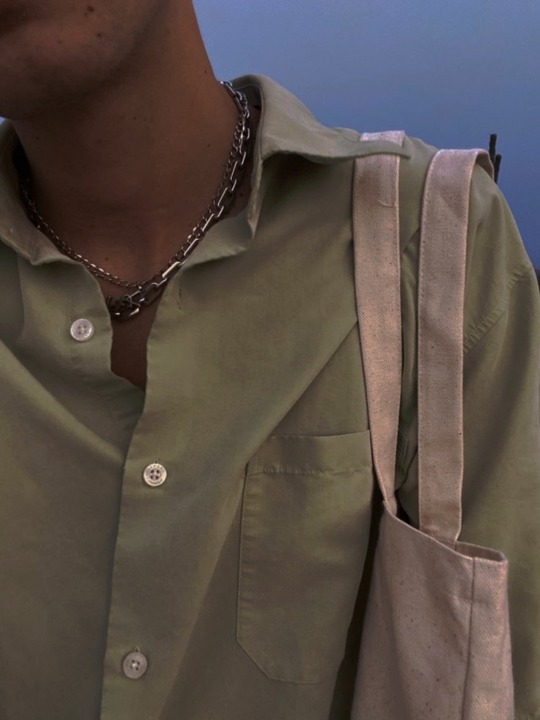


Grover Underwood; The type of friend you are
01.
Shufflemancy: Shameful company by Rainbow kitten surprise
A successful adventure always requires somebody like you. Reliable and steadfast, able to move mountains if needed. Or tirelessly drill through them with the tenacity lost upon many. You are a clever problem solver, and many come to you for advice. Wherever there is a problem, you can find a solution. Where there is a will, there is a way. You can be trusted to make important decisions or to lead the way. It is as though you come preprogrammed with a good sense of direction and sense of right and wrong. But you are not a bore, though some may accuse you of being a little too rigid on occasion. You like things a certain way, but are delighted by the lighthearted and simple pleasures that life has on offer.
You're protective and readily stand up for your friends. You could idenitfy with the term 'mom friend' or similar. Regardless of your actual age, you have always been responsible and capable of incredible reasoning skills. You argue your points well and without trampling others. Because not only are you on top of your stuff, you have a soft and gentle heart beneath the seemingly hard exterior. You really strive around people who are a little more adventurous than you and can introduce you to new and exciting experiences, and in return you are able to ward off hiccups and get around obstacles that may arise. You're often prepared for the worst, and are rarely surprised by sudden events that leave others shaken. This foresight makes you a rock others can easily lean on when the winds pick up and the clouds roll in. You can be your own worst critic, and refuse help as you feel the need to do everything yourself. Accepting assistance or delegating tasks to others would benefit you and bring you closer with those you care for.
02.
Shufflemancy: City lights by Blanche
My, oh my, aren't you a treat! You may only have a select few you let close enough to truly know you, but those with the privilege to bask in your warmth are lucky. You are very kind and gentle, and really have a way with words. A shoulder to cry on is always available when you're around, and you are quite sensitive to even the quietest nuances of emotions. You are able to read people well, and you are very observant. People often underestimate you, because kindness like yours is often perceived as a weakness. Besides this caring energy, however, you are a force to be reckoned with. Because of your observations, you are very intelligent. You are able to hold space for others, and also nudge them in the right direction when they feel lost. You are quite the sage, as your insight is often priceless and your intuition is strong and rarely leads you or others astray.
Your giving nature may sometimes be to your own detriment. You so easily put others first and forget your own wants and needs. Stronger boundaries and allowing yourself to say no is very important. You can help more people and at a better capacity if you feel okay first. Don't spread yourself out too thinly, and be sure to entrust your own grievances on those who care for you as much as you for them. You're a great example of how the loudest screams are often silent. Your voice deserves to be heard too. Despite the calm surface, you are capable of greater things. Pushed far enough or inspired to fight, you could easily bring down empires. Your resilience is admirable, and very few could survive the tales you're able to tell.
03.
Shufflemancy: Lucky by Britney Spears
Few things can truly get you down, huh? Though life frequently rains on your parade and throws you curveballs, the show must, as always, go on. You don't sweat the small things, and look to the bright side. You find beauty in madness, and have an inspiring zest for life. Even when you do get knocked down, beaten and bruised, you get up again and dust yourself off. You have a great sense of humour and love to make people smile. You're always down to clown, so to speak, and enjoy exploring the unknown and chasing possibilities. You uplift others with ease, and often serve as the biggest cheerleader and hypeman, and have a way to encourage others into seizing their opportunities when they most doubt themselves. You're bubbly with a distinct flare of mischief. You have a way to bring people together and get along with various different people from all walks of life.
Sometimes you are judged much too harshly for your optimistic outlook. You don't always fit in and don't always do what you perhaps should. You like to walk to the beat of your own drum, and sometimes that rubs others the wrong way. Many mistakingly take you for an airhead, don't take you seriously, or underestimate what you are capable of. On occasion you may feel like others view you more like a caricature than a person with more to offer than the silly and goody things you're often known for. Your best bet is to not take criticism to heart and know that those who love you truly don't really view you as one dimensionally as you fear. And as far as any reputation of tomfoolery and attracting trouble goes, you have managed to make it this far by doing things your way, so why limit yourself to the expectations not placed by yourself? You're allowed to fly and soar the sky the way you want, even if it's upside-down and sideways. You do you.
#pac reading#pick a card reading#grover underwood#pjo#energy reading#intuitive reading#percy jackson and the olympians#tarot reading#pac#pick a pile#pick a picture#pick a card#tarotblr#soapy.post
225 notes
·
View notes
Text
types of story that different black sails characters think they're in:
jack: typical underdog overcoming unbeatable odds story; he is the main character and the show is 100% about him and his joseph campbell hero's journey. he is like achilles seeking eternal glory. he is also like gilgamesh, seeking immortality because he's afraid of death
flint: one of those fairytale retelling stories from the villain's pov; he is the fire-breathing dragon/big bad wolf/wicked witch that his village has ostracized, chased out of his home with pitchforks and torches because they feared him and what he is and what he stands for. he knows that in another show, a more popular show, the story would be told from the pov of the villagers about the dangers that lie beyond the village walls and into the forest...but this is HIS show and in HIS show HE is the one that survived the villagers not the other way around and HE is the one that has been wronged and he WILL see them pay for it
miranda: at first she thinks she is the witty and cunning heroine of a regency period romance novel. she is critical of high society and it's archaic and sexist traditions, turns her nose up at the institution of marriage and yet against all odds finds a true partner in thomas. she thinks herself happier and smarter than her peers, for finding a way to explore her sexuality freely and still keep her high status. she is caught in a whirlwind romance with a handsome naval officer and well....then her story turns into a tragedy and a decade caught in lifeless loveless joyless limbo where she is sidelined into the background of someone else's story
max: overly aware that she is in A Story and that she is Not The Main Character; the spotlight is never on her, she will never take centre stage. in fact, she is in the wings, or perhaps watching the show from the back of the theatre as the stage manager, setting the scene and directing others to pull ropes, shine lights, open and close the curtains so that other actors can strut and fret their way around the stage
billy: revenge quest story! thinks he is the good guy, there to protect his friends and get revenge on the tyrant who killed his father. gains some genre awareness and realizes that he is not, in fact, the main character, but rather a side character caught in a romance between his captain and quartermaster and if he really wants to survive he's really gotta break them up
madi: a story of hope told around a campfire, passed on from generation to generation so people don't forget about the time that an island of maroons stood up to a seemingly eternal and unbeatable empire. some days, it's a cautionary tale, on how volatile solidarity can be with divisions like class, race and gender .... or how revolution necessitates violence that people who are comfortable in their oppression rather not pay... but no empire lasts forever and nothing is inevitable. the story sticks in the hearts and minds of future revolutionaries and someday someone somewhere will pick up the torch and continue the fight
season 1 walrus crew: workplace comedy
silver: [redacted]
#black sails#black sails meta#rare black sails meta text posts where i look back on it like....yeah my takes could be wrong here#i was like “huh i wonder what genre of show the black sails characters think they're in” and then blacked out#but the inherent tragedy of characters in a story IS that they dont know what genre of story theyre in#so realistically i dont think any of them would actually think this stuff through except maybe jack max and flint#anyways if it helps i did take a media literacy class in university <- things that are embarassing to admit when my takes end up being wron#charles and anne: you guys live in a story? well we live in the moment so
827 notes
·
View notes
Text
Kaiju Week in Review (November 26-December 2, 2023)
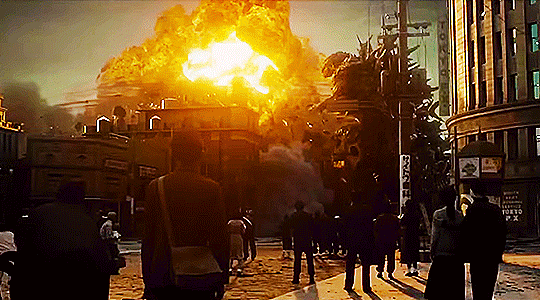
I wasn't over the moon when Toho announced that Takashi Yamazaki's Blockbuster Monster Movie was in fact the next Godzilla film. I had seen a few of his works—none bad, but none spectacular either. Well, I've set my sights on watching the rest in the new year, because Godzilla Minus One is an unqualified masterpiece. A tagline from the original Godzilla, King of the Monsters! comes to mind (as it often does when you're me): "Mightiest melodrama of them all!" A lot of the post-Showa films suffer from an abundance of characters who just spout exposition and look at monitors; here, almost everyone in the small cast gets at least one close encounter with Godzilla, and the monster's backstory is conveyed with extreme efficiency. This tale of a war veteran trying to rebuild his life in the ruins of Tokyo, stumbling into a family, finding fulfillment in blowing up leftover mines, and haunted by what he perceives as his cowardice in combat, would have been plenty compelling without Godzilla.
Since it does have Godzilla, it's high on my list of the best movies of the year, and I only need one viewing to call it one of the best installments in the almost-70-year-old series. Yamazaki patiently waited some 15 years after Always: Sunset on Third Street 2 for his shot at a Godzilla feature. You certainly get the sense, watching one of the most brutal, pissed-off incarnations of the monster ever to grace the screen, that he spent every day of it in preparation. Watch it often while it's still in theaters, and watch it big.
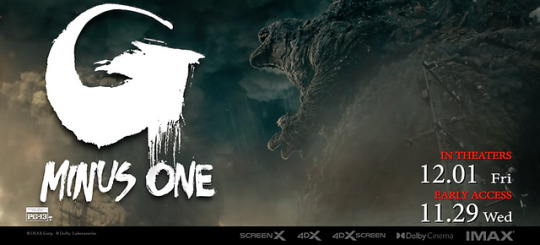
Godzilla Minus One will gross about $10 million in its U.S. opening "weekend", a third-place finish that beat expectations. For context, Godzilla 2000, the last Toho Godzilla film to receive a wide release here, made about $10 million during its entire theatrical run here. Ticket prices were cheaper then, of course, and Minus One was helped along further by almost half of attendees going to premium-format screenings. Conversely, it had to overcome Americans' subtitle phobia, and the first weekend of December is usually a slow one. I was pessimistic at the outset, but now I expect larger theaters to carry the film into the new year, especially with near-universal raves from critics and audiences.
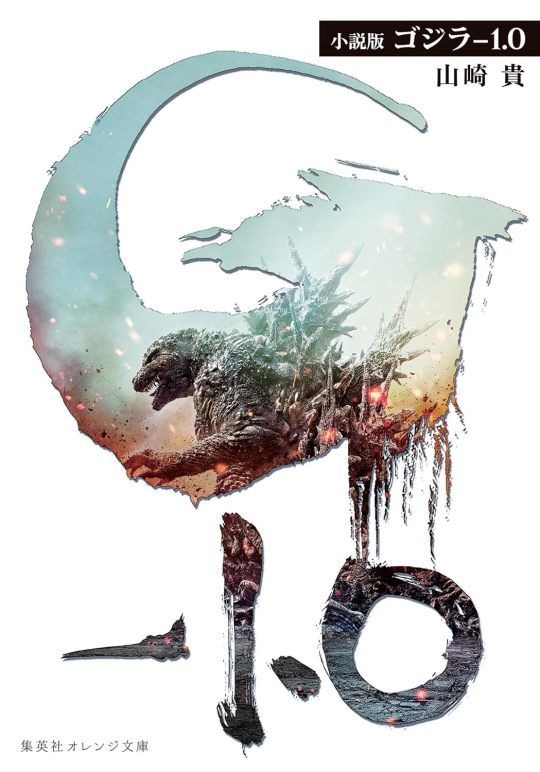
Yes, a third section for Godzilla Minus One; it's well-deserved, I promise. MyKaiju is risking life and limb by hosting an English translation of the film's novelization, written by Takashi Yamazaki himself. It appears to be at least partially machine-translated, but the Japanese text is included for comparison. Haven't read it yet, as I want to see the film a second time first, but quite a breakthrough given how mysterious this sort of thing usually is.
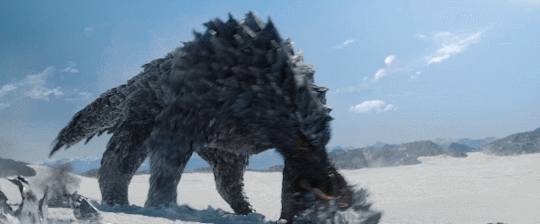
Monarch: Legacy of Monsters could never hope to compare with the opening of a stellar new Godzilla film; unfortunately, I also thought this week's episode was the weakest so far. It's bookended by Frost-Vark action, but the rest just drags. All's forgiven if the teacher and the hacker smooch though.
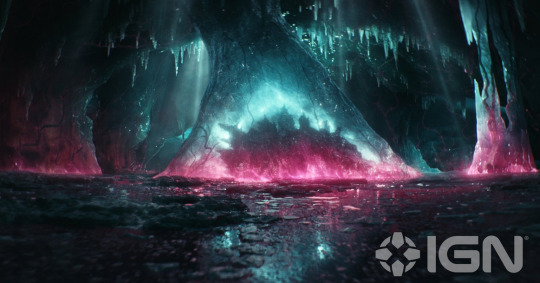
Toho and Legendary used to let each other's live-action Godzilla movies breathe; now the U.S. opening weekend of one is coinciding with the opening marketing push of the other. IGN released a trio of pics from Godzilla x Kong: The New Empire, showing Kong with his axe; Dr. Andrews, Jia, and Trapper (Dan Stevens's character) in uniform; and Godzilla "evolving into a powerful new form." The same article included an interview with director Adam Wingard. Naturally, he didn't give away much... besides the return of Doug.
Earlier in the week, Legendary put out a trio of posters featuring Godzilla, Kong, and the film's antagonist, now christened Skar King. The taglines ("Unite" for our heroes, "Bow to Your King" for SK) sound like kaiju campaign slogans. Makes me wonder if, like Godzilla vs. Megalon before it, the movie will improbably capitalize on the presidential election next year. To steal a joke from Titanollante: Godzilla/Kong unity ticket? They'd have my vote.
Godzilla's new form, meanwhile, has already been spoiled by a T-shirt on Legendary's own site and some dire-looking Playmates figures. It makes sense that Wingard would want to have his own spin on the character after keeping the design from Godzilla: King of the Monsters for Godzilla vs. Kong. Hard to cast judgment without seeing the real design in full, but there's one particular detail I really like.
The film also has a booth at CCXP in Brazil, with a panel later today, so I think a trailer is incoming (the main reason I hammered out this whole post so quickly).
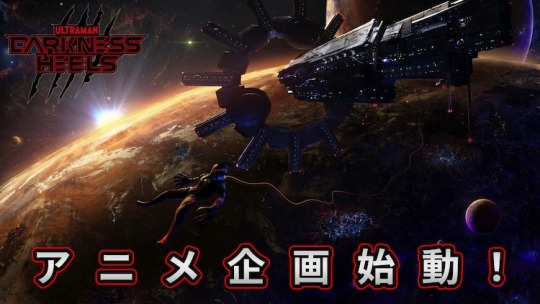
I missed this one last week: Tsuburaya announced an anime project called Ultraman: DARKNESS HEELS. The DARKNESS HEELS branding has been around for a while, spotlighting prominent evil Ultras—and, of course, Jugglus Juggler. No details on the anime yet, but if the Juggleman's there, so am I.
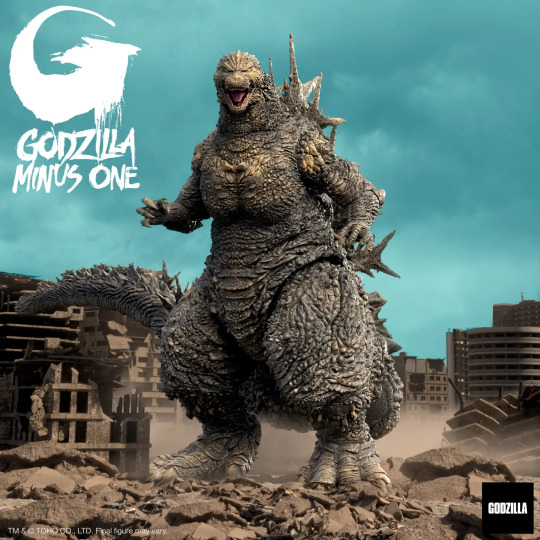
The big toy reveal this weekend was Super7's ULTIMATES! MaiGoji figure. Previous Godzilla figures from this line haven't lived up to the official photos, but hope springs eternal. It's $85 (much less than the MonsterArts); preorders started Friday. Other highlights: a Super7 ReAction figure of the original Godzilla's skeleton, which comes with a little Oxygen Destroyer, and a plush Mothra from Surreal Entertainment that can flip to imago form to a neck pillow-shaped larva.
#kaiju week in review#godzilla#godzilla minus one#monarch legacy of monsters#godzilla x kong the new empire#ultraman darkness heels#kaiju
113 notes
·
View notes
Text
Imperium Sanctus
(...T)he phrase “Grimdark” may suggest the name of some 2000s era Goth club. It’s a recent coinage for an ongoing craze in “gritty” and dark fantasy settings, epitomised and popularised by George RR Martin, becoming the default tone for a whole range of feted fantasy offerings from Joe Abercrombie’s First Law series featuring a dark, brooding protagonist who kills a lot of people — and occasionally feels bad about it — to Mark Lawrence’s Broken Empire Trilogy featuring a dark, brooding protagonist who kills a lot of people — and occasionally feels bad about it.
Like many fantasists with a bone to pick, mister Milbank doesn't actually know when or where "grimdark" was coined. Knowing fuck all has never stopped a critic (indeed, The Critic): Milbank goes on to blame everything from Breaking Bad to The Sopranos, constructing a spurious history of dark fantasy(?) that ultimately singles out author Michael Moorcock as godfather of grimdark.
While Moorcock’s gory, British sorcery is a major influence on today’s grimdark, the inception point of the trend is in fact googleable: it’s been the tagline of gory, British science-fantasy wargame Warhammer 40,000 since its 1993 second edition.
In the grim darkness of the far future, there is only war.
Already this betrays the hopepunk's antimaterialist concerns. It doesn't matter that The Walking Dead and Boardwalk Empire are nothing alike. Taking the historicist tack, it becomes even less likely that they have a connection to 40K. But morality, as an immaterial concern, is a laser beam: it vaporizes material history. Grimdark is a specter on the pages of anything that irritates gentle sensibilities.
For the sake of avoiding googleable gaffes, Alexandra Rowland, author of books named things like A Taste Of Gold And Iron, and coiner of "hopepunk", in a follow-up essay:
There’s no such thing as winning forever. Evil cannot be vanquished, only beaten back for a day or two, and then it trickles back in, like water seeping through the cracks in a dam.
Ask it of hopepunk, then: "What's the point?"
And the answer is, of course, that the fight itself is the point.
In the noble brightness of the far future, there is only (___)?
Unlike Rowland, Milbank is a nothingpunk: The Critic is a conservative Christian rag pontificating everything from trans-exclusionary rhetoric to the dismantling of higher education. Which begs us to consider how Milbank so easily co-opts shades of Rowland's language to peddle a retvrn to Tolkien, on its face the last thing a fantasy author looking to innovate would want.
The Imperium of Man, the central setting of 40K, is an arch-conservative Great Man cult worshipping the once-Emperor of Mankind. This is the gate leading to the inner sanctum where the Emperor's corpse resides. Catholic readers may have noticed similarities to portrayals of the Archangel Michael fighting the Dragon (1400~, 1498, 1860), as narrated in Revelation 12.
Revelation is the tale of darkness enveloping the world, and the noble, virtuous men who persevere despite persecution and are eventually victorious in heavenly war(!). This is not dissimilar to J.R.R. Tolkien's "fundamentally religious and Catholic work", in which ordinary men persevere against darkness enveloping a world. Rowland and Milbank both champion Tolkien as exemplary, the former in the same breath as Jesus. Yes, of Nazareth.
The Lord Of The Rings is unmistakeably about the War of the Ring. Positing Tolkien's apocalypticism as aspirational fails to rebuff the basic conceit that war is a human constant and even a force for good. If this isn't the aim of a genre purported to concern itself with kindness and "giv[ing] a fuck about the people on the other side of the world", what is?
Aesthetics. Rowland doesn't call for a narrative movement with less conflict, but one that appropriately celebrates those that fall on the right side of conflict. Even just those that deigned to imagine, of slaying the Dragon, "probably drunk in a bar somewhere, I bet it can be done, though." (The writer's original temptation: a medal for thinking the right thing.) Millions of people die in Revelation, magnitudes more than in Game of Thrones, but the virtuous go to heaven forever. The Emperor of Mankind sits on the Golden Throne, Frodo bodily assumpted into the Undying Lands, Jesus curled up into a ball and just rolled away. All manner of things shall be well.
The transition from here to open conservatism is again in aesthetics, and thus stepwise. Having established Tolkien as the only fantasy writer he respects, Milbank derides grimdark as immature wish fulfillment. If you write fantasy at all, it ought to have a clear moral message, else you are devaluing reality by infesting Real (not in the Lacanian sense) conflict with magic missiles. But he's also established that realistic fiction with no clear hero is a faux pas. He wants Breaking Good and, like, The Walking Alive.
This is no surprise: if you were around for the Disco Elysium craze, you might remember this tweet (holy shit it's still up) calling for a game that uses Disco's systems to narrate the story of "a young witch" looking for her neighbor's cat. Take another step and this is the logical conclusion of an aesthetic that prizes upright moral posture: a world where the protagonist has to do nearly nothing to be good. The little village in the Alps and the events of Disco Elysium might be unfolding in the same world. But our little German girl with no problems doesn't have to participate in anything as unsightly as a Pinkerton massacre. Milbank disdains C.S. Lewis without knowing that what he wants is the end of Narnia, irrespective of the events that preceded it: the crowning of the king, who once was good. The Emperor protects!
83 notes
·
View notes
Note
I guess it's also time for the annual ask: Thoughts on The League of Extraordinary Gentlemen?
@mirrorfalls asked: Perhaps it's time to touch the elephant in the room: thoughts on League of Extraordinary Gentlemen?
anonymous asked: Any thoughts on Moore's LOEG?
anonymous asked: any advice on how to do a fictional character mashup story ala chimera brigade, league, etc?
anonymous asked: you wrote a bit on the wold newton universe and the chimera brigade, any thoughts on league of extraordinary gentleman?
(TW: sexual assault, also a whole lot of racism)
(clip from Anti-Spook Squad by Doctor Lalve)
Let it never be said I don't love or do anything for you people because Jesus Christ what an ordeal.
It was pretty inevitable that I'd eventually have to talk about LOEG given the, niche, I made for myself here, and given I'd read and touched on all these other works that either inspired it or were inspired by it, like the Wold Newton Universe, The Chimera Brigade, Tales of the Shadowmen and etc. I'd read through plenty of different LOEG takes and fics, it's an idea that has a lot of appeal on it's own and is easy to flirt with, if not so easy to pull off.
One thing to put upfront: Kevin O'Neil was a brilliant, one-of-a-kind creator and his work here is great, it's the one thing almost unimpeachably great about the whole thing except when he's asked to draw racist caricatures, which he does quite a bit, we'll get into those. I love the collaboration between Moore and O'Neil and I frequently enjoy the little tidbits where they show up as themselves within the supplemental material. O'Neil does a lot of heavy lifting in these even at their worst, in fact especially at their worst. This comic is a legitimately impressive achievement, and I don't regret reading it, if nothing else I think it was a hell of a wake-up call in regards to all of it's warts I may have been overlooking or replicating in my work or that of others.

I'm gonna break it down by going through the individual installments:
Volume 1: One of the nicest things there is to League is that it only keeps getting better, in the sense that it starts off on the worst foot and it gets better by virtue of not really being able to get worse (yes, even with the Golleywog and Harry Potter sections and whatever). From the moment you open the book it takes about six pages for Mina to be assaulted by Brute Arab Rapist Hordes that Quatermain and Nemo have to gun down, and that pretty much sets the stage on what to expect. Volume 1 is where the series has yet to jump off the deep end in tackling all of fiction, being a more grounded adventure story based on it's premise of being a comic book crossover/hero team comprised of Victorian era literary characters. It's LOEG at it's shallowest and most straightforward, and also at it's least impressive. I'm not remotely charmed by much of what's done here, I've seen a million variants of these before and many of those weren't that great either, but their lows weren't as catastrophic.
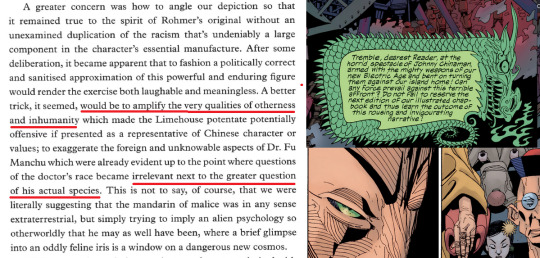
(text comes from an essay Alan Moore wrote regarding his usage of Fu Manchu in the book, which was scanned and sent to me by @mirrorfalls, thank you for that.)
The LOEG's first enemy is Fu Manchu and the book sure likes depicting leering hordes of yellow peril cartoons for our heroes, Mr Hyde in particular, to brutally mow down. Alan Moore thought the genius trick to making Fu Manchu not-racist was to make him as inscrutable and sinister as possible so as to not even appear human, which is a great understanding of how racial caricatures work guys, the "not potentially offensive" shirt has people asking a lot of questions answered by it.
I've heard a lot of claims over the years that LOEG was intended to be a parody, or satire, and that it's using Fu Manchu to make a point as a criticism of the British Empire and imperialism, and I'm gonna make this clear before we move on: LOEG is not a parody or satire, not as a whole. It parodies and satirizes a lot of things, but it is neither parody nor satire. It is very much in love with much of it's subject matter even when it wants to burn it down. LOEG is also a frankly terrible critique of imperialism, it is one of the most imperialist things I've ever read. Part of it is because you can't just recycle problematic garbage and claim it's commentary, especially when you're going out of your way to sensationalize said garbage to be provocative or in many cases add shit that wasn't even there in the first place. Moore asked if anyone else was gonna try and criticize colonialist bigotry in fiction by tripling down on reproducing it as hard as possible, and then didn't wait for an answer before doing it.
Volume 2: Objectively an improvement over the first if only because Fu Manchu isn't there. It's also where the book kinda improves in terms of making a critique. LOEG never really has much to say about it's characters, instead developing them in service of the story or social commentary, and Volume 2 is better at it than the first. Still has a lot of the same problems as 1, it's still a shallow team-up thing that wants to have it's cake and eat it too, it's still the worse version of a concept that's been done many many times before and after. Edward Hyde gets the bulk of the focus here and he was very clearly Moore and O'Neil's favorite character to work on, he gets the most memorable sequences for better or worse. I don't wanna talk about him much and I don't wanna talk about how the book wraps up the Invisible Man's subplot (and how it's not even gonna be the last time sexual violation of a villain is played for oh-so-horrific catharsis), I'd frankly like to stop thinking about it.
The Traveler's Almanac was definitely the most exhausting part to read in full and only not a total waste of time because of Jess Nevins' annotations, which turn this into fairly valuable research material. But so do Wold Newton articles and they're really not the most riveting thing to read, and at least those have a point or constrain themselves to a single topic or character, or are briefer and come with resources on hand or have a point or even can pitch some neat/cool ideas and concepts as a whole. Jess Nevins even did the better version of this in his own WNU chronologies.
Where as this is just complete ass and there's only so many times you can read a variant of "and then we went to this place with horrible cannibal savages and then we went to the other place with beautiful cannibal savages and then we found this utopia and then we found this dystopia and then we referenced this and that and this and that", and it brings me to another point I'd also seen brought up a lot in regards to LOEG: that it's too damn anglocentric to live up to it's premise, too contradictory within itself, and it was always too big of an undertaking to be done the way Moore and O'Neill did it.
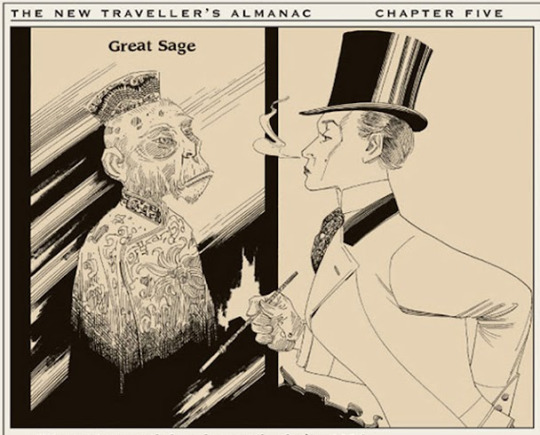
I appreciate Moore trying to make this world feel like a world, in as gigantic all-encompassing a scale as he could possibly account for, with a full world tour and internal chronology. I sure would have liked a big fiction crossover almanac with entire chapters for Africa and China and South America, but we don't get that, because EVERYTHING in them is taken from colonial texts elevated to fact. Literally, entire paragraphs taken from political and colonial texts. All the time spent dicking around with all of those Euro political texts and ancient lore that just had to be paid it's due, and then Orlando goes to China and finds Sun Wukong stuffed as a public freakshow and dismisses his mythos as a bunch of loony (but intriguing and exotic!) hogwash, and Godzilla is later brought up in one line of dialogue to mention how Hugo Hercules killed him offscreen. (I think those might be the only two texts Moore brings up that aren't from European/American sources? There might be others but good luck finding them in the annotations).
Is it unfair to expect Moore to have read all of fiction? Of course it is, but that's what he wants this to be about, he wants this to be about All of Fiction and he wants to write about Africa and China and South America with nothing but colonial texts about those places as reference. He wants to write about how the things he likes are cool and happened and are real while the things he doesn't like don't count or are garbage or didn't happen the way we were told happened. He wants to make a story criticizing racism and misogyny in fiction while writing a text far more racist and misogynistic than most of the things he's bringing up. It's irreconcilable.
Black Dossier: It's constantly jumping between different formats and having to adjust it's prose and visual style accordingly, and it does that fairly well (the beatnik section is completely fucking unreadable though, the prose sections are already a handful to get through as is but that one was too much even for me), although Tempest I think is gonna do it much better. It's got some good parts, it's also got some bad ones. Definitely more readable than the prior two + Almanac.
This is the one with the Gollywog in it and I'm not gonna talk about that thing, I think what's wrong with it is self-explanatory as is. Look, I truly love a lot of Moore's work I've read, and I think a lot of the pushback against Alan Moore painting him as just a cranky old man who hates comics is overblown and shitty and symptomatic of bigger issues with how fans discuss comics and superheroes, but his defense of the Gollywog and his response to the criticisms of LOEG was embarassing and beneath him.
Century: This is the one with Harry Potter and The Lightning Penis in it. To those of you who heard at some point that Alan Moore had done a much-maligned pisstake on Harry Potter and got curious, don't get your hopes up. It's nothing, it's not even that mean, it's just a crude crayon doodle in service of a larger and very dumb critique of modern fiction that could have been anyone. Shame that he bullseyed ahead of the schedule the cultural about-face against Harry Potter without having anything actually criticizing Harry Potter to show for it.
Century does work for me a bit better because it dispenses with the pretense of the series and has it build up to the big awful tragedy it ends on, with all of it's remaining characters miserable immortals and all the fictions having curdled up and gone sour. It works for me only because I have no love whatsoever for this world and so it destroying our characters in the service of the larger narrative about stories and fictional immortality and whatnot is a decision I agree with and I think makes it stronger, even if the social commentary / the story's criticism of modern stories compared to the old ones is frankly absurd. Century I think was perceived as Moore/O'Neill having lost the plot, but to me it feels like the plot (more importantly, the point of it) finally showing up after so much pointless dicking around.
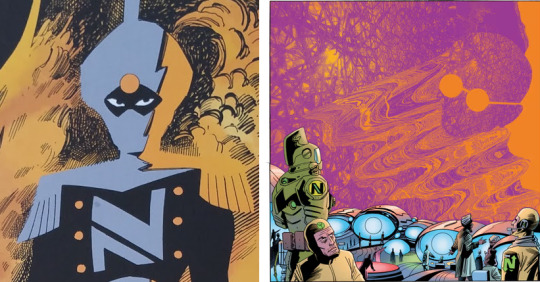
The Nemo trilogy: Easily the one I most enjoyed reading, the Nemo Trilogy is almost like a breather set in between books, just fairly straightforward pulp adventure stories done in far less rancid a fashion than Volume 1. It feels less like a LOEG book and more like one of those LOEG fanfics made by people who like the concept and characters but are dissappointed by the books, so they fill or add or rewrite in the blanks with their own ideas, which is basically every LOEG fanfic ever made. I quite like Janni Dakkar as a character and I'm already a huge mark for Captain Nemo, one of my favorite characters ever, and I was of course very glad to get away from the extremely tiresome Mina/Allan/Orlando trio for a change. Frankly I'd even recommend these as a standalone, they're so disconnected from everything else in LOEG.
If you guys want to read a comic take on Captain Nemo though, read Mobilis by Juni Ba. Infinitely better than anything Moore did with the concept of Nemo, takes far less pages to actually explore the character meaningfully and has far more interesting, more humane and personal things to say and do in general, one of the best things I ever read and a tremendous palette cleanser after LOEG.
Tempest: Tempest is what I'd call the best of the LOEG books, in terms of craft and in terms of achieving what it sets out to do. Namely, it's one of the most elaborate and most artistically impressive slowly unfurling middle fingers I'd ever read, Alan and Kevin in full burning down the house mode throwing everything they've got at the wall, playing around with as many different styles and gags and ideas as they can cram into the great apocalyptic ending of their collaboration. It's a very spiteful work that has a lot of joy and humor to it, fully divested from giving a shit about it's characters and instead recasting them as the bit players they always were in the grand fuckening of humanity at the hands of our fictions.

It gets to burn down everything and also preserve everything in a big dreamy Noah's Ark forever, it plays to every strength the series had, and frankly I barely minded the detours because this thing is all detours. The superhero parody that takes up so much of it isn't really anything funny or insightful or really anything, but there's good bits in it, and I like Alan Moore talking trash about superheroes (of course, it pales in comparison to What Can We Know About Thunderman, but that one is a league of it's own). It's Alan and Kevin's farewell to comics with all the mixed feelings towards it and the industry and the subject matter they both have decades of so much experience with it. It is The End of Everything and I think it ended on the best note it could have ended with.
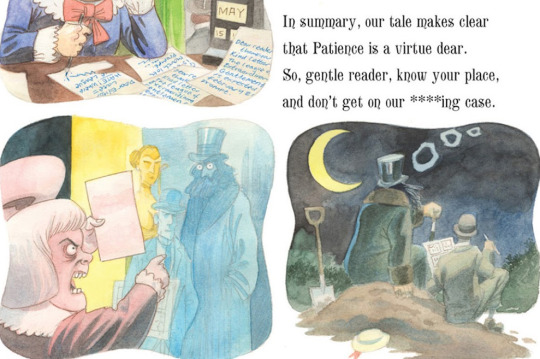
In summary, I think LOEG has a lot of individually cool or neat or even great ideas that I think get lost, because there is so, so much of it, and so much of it is impressively painted sludge. Sometimes it is ingenious, sometimes it is fun, it is never not visually impressive, but it's more frequently dull and grotesquely self-indulgent and far too shallow. It suffers from an almost inescapable side effect of doing this dealing with the fiction he was dealing with without accounting for taste or bothering to reign in his worst impulses, too much to cover and not enough actually being said about it. In truth, much of it doesn't feel much different than reading the wiki summaries for it I had already read forever ago. It is a unique beast taking swings that I'd never seen before that most wouldn't, probably for very good reasons most of the time. It is also guilty of literally everything it's criticizing other works of being and doing, and sometimes it actually provides it's best commentary because of that! It's a complicated thing to tackle and wrap your head around. God knows what Jess Nevins must have gone through to make the annotations for this, as they put it on the Almanac annotations.

I don't consider it wasted time because, I did really enjoy the final two installments, there are good bits scattered across the other books and I learned some good things from it as a whole, but would I recommend it in it's entirety? Unless you're really a huge fan or completionist for it's creators (although reading LOEG really disillusioned me on Moore in a lot of ways, not that this is a bad thing, if anything that's a necessary thing to really try and grasp a creator's body of work) or you're the kind of sicko who'd be in the tank for the whole thing, no, not really.
It is one of the most impressive and accomplished works I've ever read, I will probably come back to it for research purposes, but holy shit am I glad to put it behind me.

#also thank you davidmann for sending me the epilogue#replies tag#loeg#league of extraordinary gentlemen#alan moore#kevin o'neill#abc comics#comics
55 notes
·
View notes
Text
At times in the writing of wine history, wine itself has been treated as a historical actor. This is the case in many of the sweeping histories of wine, such as Hugh Johnson’s original Vintage: The Story of Wine, Paul Lukacs’s recent Inventing Wine, John Varriano’s Wine: A Cultural History, or Marc Millon’s Wine: A Global History. These lucid and entertaining histories, written by great narrators with serious wine expertise, follow a similar narrative arc. Wine is the central protagonist, the potable Zelig, popping up in different historical moments in different parts of the world. The story begins in the Fertile Crescent, where Wine is born, or in the ancient Mediterranean, where Wine enters a boisterous adolescence in the symposia and bacchanalia of the ancient Greeks. The reader is invited to pause and appreciate the wine-themed mosaic and shards of amphorae. The story then skips a few centuries and a few hundred miles, to medieval Europe (we are left to wonder what Wine has done in between), where Wine joins forces with powerful and institutionalized Christianity and canny monks create a patchwork of orderly clos on the Côte d’Or: bless them! Wine remains in France, or perhaps summers in Germany, and Bordeaux emerges in the seventeenth century, eventually finding its way to Britain (we are treated to a Samuel Johnson quote, or Pepys). Port and sherry have their seafaring adventures. The nineteenth century opens with Champagne surviving war, producing widows and conquering Russian markets; France produces Pasteur, who produces better wine, a triumph of science and the Enlightenment; wine is enjoying its golden years. Then, three-quarters of the way through this drama, tragedy strikes, in the form of the vine disease phylloxera. Wine is dealt a staggering blow and its very survival is threatened. Fortunately, a new world of scientists, mavericks, and neoliberal entrepreneurs emerge: capital is found, the plucky New World steps in to help, and new vines are grafted. Wine is saved! This cannot be criticized as being a Eurocentric narrative, because the tale concludes in California, or Uruguay, or China. Undeniably, at the conclusion of this story there is incredible momentum and optimism. Global wine production is the highest it has ever been, consumption of wine is high, and wine is (relatively) cheap. Were he a wine historian, Francis Fukuyama would declare it the end of wine history.
This hagiography of Wine is a great read: a mouth-watering tale of high drama, blind monks, and supple tannins. And it is not necessarily inaccurate. But it is, on the other hand, what British historians have called a Whiggish narrative: one that presumes continual progress, culminating in the current era, which is assumed to be the best ever. This Whiggishness may overlook some of the current difficulties in the market, or shrug off past problems in the wine industry, since all ended well. Geographically and chronologically it is uneven, such that the producers studied here generally do not merit inclusion until they have become major global actors. This type of narrative structure is what gives the false impression that South Africa produced a great wine called Constantia in the eighteenth century, and then produced nothing again until 1994. The place of Wine as the embattled protagonist who overcomes many hardships (vine diseases, consumer apathy, high taxation) and emerges triumphant and affordable in the late twentieth century, is also what is known in Marxist terms as “commodity fetishism.” As Bruce Robbins has argued, in the new commodity histories, “each commodity takes its turn as the star of capitalism.” The commodity itself, rather than the social and economic relationships that led to its production, becomes the driving force of the narrative.
Jennifer Regan-Lefebvre, Imperial Wine: How the Empire Made Wine's New World
44 notes
·
View notes
Text
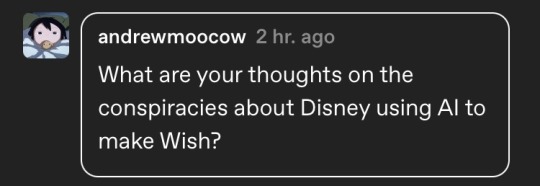
@andrewmoocow Personally I find them to be misguided. There is a very well-done analysis video I've cited before that talks about the animation and why it ends up looking like AI, and I think it really addresses this argument better than I could --
youtube
-- but TL;DR, the animation looks "fake" largely because of stylistic decisions (l.e. turning off motion blur with the thought it would look "more like 2D") that weren't well thought-out. And I actually think the film's writing issues run into the same problem.
Because here's the thing -- writing high fantasy is not as easy as it looks. I can testify to this because I myself am writing a draft for a high fantasy novel right now.
All these years, Disney has been in an advantageous position with their animated films largely being adaptations of previous works, since they're already given a lot of the parameters a writer needs to build a world, plot, and characters. In a Snow White adaptation, for instance, you need a vain queen, an innocent princess, a prince, seven dwarfs, a magic mirror, and a poisoned apple, as well as a fairy tale world where these things fit comfortably. And since so much mainstream fantasy is largely inspired by medieval Europe, that aesthetic remains very familiar with audiences to the point that you need a lot less explanation for things. We don't really need an explanation for the political landscape of Cinderella because we see "fairy tale kingdom" and immediately know it's an absolute monarchy led by generally amiable rulers. We're not surprised when fairies appear in Sleeping Beauty, or when a magical sword predicts who should be king in The Sword in the Stone, or when Tiana and Naveen are turned into frogs in The Princess and the Frog, or when trolls appear in Frozen -- all of these magical conventions fit within the usual fantasy aesthetic and really don't need any explanation or backstory. I'd hazard to say that most people -- aside from those nitpicky critic types who get all hung up on how many servants are in Beast's castle just because they saw a bunch of extra silverware in the Be Our Guest sequence -- just don't bother questioning these things. And the original material also gives some shape and form to the adaptation's story, characters, and overall feel. It doesn't matter how close the finished product matches the original idea or even how familiar the audience is with that original material -- it still provides a jump-off point and sense of focus for the writer(s), the same way fanfiction (even an AU fanfic) can, in contrast to original content.
All right, well, what about those Disney projects that aren't fantasy? Well, in the case of stories like Treasure Planet, Robin Hood, and Mulan, they're still based off preexisting properties that people will find familiar enough that the writers can focus more on the adaptation's unique additions and not focus on detailed backstories and explanations about how the world and societies depicted in the story work. It's a lot easier to just focus on the fantastical elements like the space tech, talking animals, or Mushu and the ancestors if the rest of the story and cast are relatively easy to understand. Even in the case of original stories like The Lion King (which admittedly was largely inspired by Shakespeare's Hamlet, but I digress), Lilo and Stitch, and Lady and the Tramp, they still exist in a non-magical world that closely resembles ours, with only superficial changes like animals being able to talk or the existence of aliens. Even quasi-historical settings like The Great Mouse Detective and Atlantis: The Lost Empire look enough like our real-world equivalent that their settings are largely recognizable to us.
In just about all Disney animated films, the screenwriters didn't have to world-build that much. They didn't have to put the character development and plot on hold to explain the rules of the universe these stories take place in that often -- not unlike how writers like Rick Riordan didn't have to explain as much about the country his hero Percy Jackson lives in, because his books are an urban fantasy where our real world is just "plused up" with magical elements. We don't need to know if gravity works on the story's characters the way it does for us. We don't need to be told about the political landscape, history, or terrain of our location. We don't need to ask whether dying is something our characters can come back from.
Wish, on the other hand, is an original story in a high fantasy setting that doesn't resemble our world. People might try to claim it takes place in the Iberian Peninsula, but come on -- Rosas is a completely fictional country in a world that has magic we don't know the rules of and countries that faintly resemble cultures from our world, but we don't know the histories of or how similar they actually are to their real-world inspiration. We also have a cast of characters we've never met in any other media and a story and messages that we know nothing about beforehand. This means that we have no preexisting framework going in for what's possible and impossible in this world; no frame of reference about who these characters are and what their histories are; and no parameters that the plot, characters, and themes must fit inside, whether based on the fantastical story being adapted or a real-world setting that's a lot like ours. And I don't think that Disney really thought through just how challenging it can sometimes be to tell this kind of a story without stuffing the script with a lot of "tell" and not "show," which, as just about any film person can tell you, is the exact opposite of what you generally want. In film scripts, you want to show your audience a lot more than you tell them -- this not only takes full advantage of the visual medium and communicates your point in a much more natural and artistic way, but it also lets your audience think for itself and come to its own conclusions.
Now of course, can you write a high fantasy original story that's easy to follow and evokes a lot of emotion in your audience? Of course! But it does take time and a lot of careful and creative world-building. J.R.R. Tolkien was the king of such things. George R. R. Martin has done it. Neil Gaiman has done it. Ursula K. Le Guin has done it. Even the writer of the Nimona graphic novel, ND Stevenson, did a good job of it! But I think it's quite clear that Wish's script was not in the works that long -- development of the original idea started back in 2018, yes, but it wasn't until January 2022 that it was announced Jennifer Lee was writing it and Julia Michaels was brought on to write the songs, so the film's current trajectory likely wasn't pinpointed until then. And if the film was released in November 2023, then that means Wish's script was finished in under two years. Although there are successful Disney scripts that I daresay needed only that much time (Frozen, for instance, was quite rushed, by all accounts), once again, those scripts were done for stories with some sort of preexisting framework that allowed the writers to skip explaining certain visual or contextual short-hand in favor of focusing on their own creative flourishes in character and story. They were written with a tighter focus on the plot and its players without the need to build a complete stage under them.
The reason some people want to cry "AI!" when they look at Wish's writing is that they're looking at a script that makes the rookie writing mistake of exposition-dumping in an attempt to make its audience care, rather than evoking emotion. That kind of exposition-dumping is something that most novelists usually have to trim and rewrite in future drafts of their work: it's a mistake done while the writer is trying to world-build enough that their audience understands all of these original rules, societies, locations, and characters they're not familiar with. This exposition is then often trimmed down before publishing, and when adapted for the screen it's often trimmed even further or even completely rewritten, in favor of more visual methods of conveying the same information. The Wonderful Wizard of Oz writes about Dorothy traveling down the Yellow Brick Road and about the long journey that takes her and her friends through a lot of side adventures on their way to the Emerald City: it's the famous film adaptation that cuts out the Kalidahs and puts the whole trip to jaunty music for the characters to sing and dance to. Wish could've communicated to us the importance of the wishes to their owners through more visual means, but instead feels the need to reiterate this idea over and over through written dialogue. And again, this is a common mistake by writers when they're inexperienced in creating completely original content, as opposed to spin-offs, sequels, or adaptations of other people's work.
AI writing is generally known for repetitive phrasing and sentence structure, lack of accuracy, and lack of a personal touch. As much as I'll agree that there are a lot of character and world-building choices in Wish that don't make sense, I don't think that's the same thing. There clearly was a story someone (or multiple people) wanted to tell about a person hoarding the precious ideas of other people away, even if it means those ideas can never be shared with the world -- it just wasn't a story that ended up being told that well. And I think this is why Wish is almost worth seeing -- it serves as a good example of why certain writing decisions work better than others and how writing for fantasy projects and/or "family entertainment" is an art form that's worthy of respect when it's done right.
To sum up my stance on the matter -- I think Disney just bit off way more than it could chew and then didn't give its writers enough time to properly digest it.
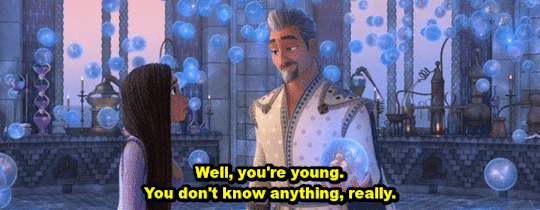
29 notes
·
View notes